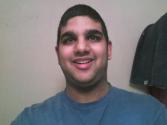223rd American Astronomical Society Meeting
American Astronomical Society Meeting
January 5, 2014 to January 9, 2014
Washington D.C.
Meeting host: By:Kevin Victor Gima
SPS Chapter:
Were you ever faced with the prospect of a boring, uneventful Christmas vacation? I certainly was. But then I discovered that the American Astronomical Society (AAS) was having its 223rd meeting right here in Washington, DC, only a couple of miles from my place of residence! How could I pass up an opportunity like this?
I first became interested in astronomy in the 5th grade. I was browsing through various books in the local public library when I stumbled onto a couple of books about black holes. When I started to browse through them, I immediately became interested. The idea of black holes leading into parallel dimensions, time travel, and other bizarre topics immediately intrigued me. Ever since then, I have been trying to read anything I can about black holes and other related topics.
The first event I attended at the AAS meeting was the AAS Undergraduate Orientation. My main purpose for attending was to figure out how to get the most out of the AAS meeting. On arriving I received a small, thin bookmark containing suggested activities all undergrad attendants are encouraged to do at the meeting. After a brief explanation of this and a welcome from AAS representatives, the students were cut loose to converse with representatives from various graduate programs that sponsored the orientation.
The first representative I talked with was a graduate student from Texas Christian University. His kind demeanor really impressed me. Striking up a conversation with him was really easy. First, he talked about his experience in the program and his research focus. Then, he told me about the summer research program for undergraduate students. Initially, I had my doubts. I felt that I didn't have a chance at getting any research experience because of the competition. He rebuffed my doubts by saying that even though it is really competitive, there are a lot of great opportunities for students around the country. Hence, I may have a fairly good chance of getting in.
After learning about Texas Christian University and their program, I talked to a professor from a Canadian graduate program. Although the conversation started with a discussion about his specific program, it soon progressed to the general process of applying to graduate school. He stated that applying to graduate school is kind of like a game. It is a game in the sense that you have to do many different things to make yourself stand out. He stated that doing these things is not necessarily a requirement (getting research experience, for instance). However, doing them will make your application stronger. The professor was very friendly and likeable.
The next day, I attended a variety of talks and lectures. The first one was an on gravitational lensing, and was geared toward the public and amateur astronomers. Many talks at the meeting can be very technical and hard to understand. In an attempt to alleviate this, the society created a series of “amateur” talks to familiarize people with various topics. One thing that interested me from these talks was the concept of exoplanets. Exoplanets and the discovery of habitable planets are hot topics now. This led me to realize that attending scientific conferences regularly is very important for keeping up-to-date with contemporary research.
The next talk I attended was about an upcoming encounter between Sgr A (the Milky Way's super massive black hole), and the gas cloud named G2. This encounter is important because it is a rare opportunity for astronomers to test some of their theories. Once again, for me the importance of attending this meeting was to see what is current in the field of astronomy. This is one of the most important research topics right now.
Next I attended a talk on the evolution of elliptical galaxies and black holes. Even though some of the research was way above my head, I learned that in order to know more about super massive black holes we first need to get a census on them, meaning that we need to get information on as many super massive black holes as we can.
The most interesting talk I attended was on Thursday afternoon. It was about dark matter and energy. The speaker was Tianxi Zhang, a professor frrm Alabama A&M University. He lectured on something called the Black Hole Universe Model. The model postulates that our entire universe is a black hole. The professor has been working on this model for a number of years and has written a variety of papers on it. Because of my interest in black holes as a kid, his model sparked immediate interest. When I went home, I did some brief research into his background and institution. I found out that his university has a graduate program for physics. Since that professor is researching something that I find interesting, I may apply to that graduate program to work with that professor.
The 223rd AAS meeting was an extremely enlightening experience. I learned how much specialization exists within the field of astronomy. This was evident by the very technical jargon that the various lecturers used. Furthermore, I was exposed to various issues that the astronomical community is researching. When I become a professional it will become extremely important for me to keep current with contemporary research. Most importantly, however, I developed my network and exposed myself to some of the research opportunities that are out there. When going to professional meetings, it is always important to expand your professional network, as I did that very first day at the Undergraduate Orientation.
Areas of Alignment: Career Resources: Scientific Categories:
